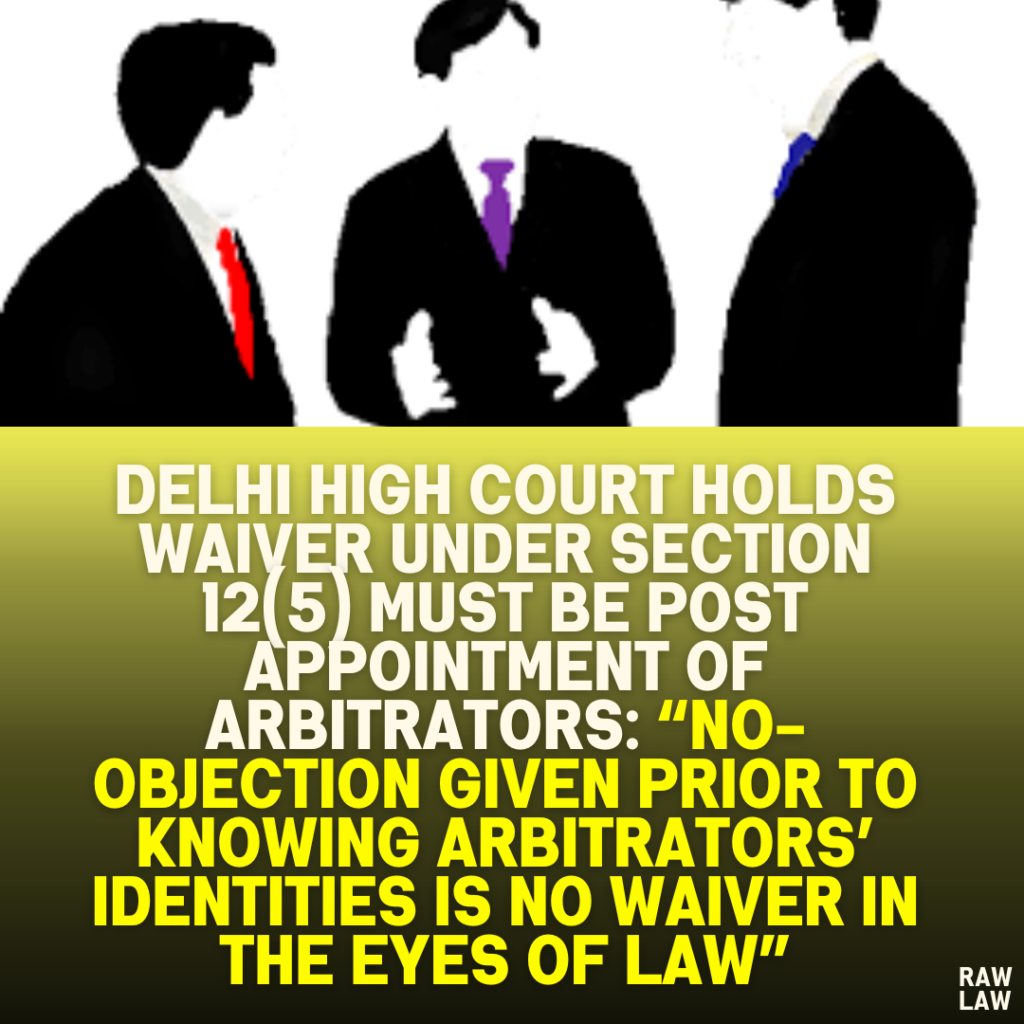Court’s Decision
The Delhi High Court held that the petitioner’s waiver of the applicability of Section 12(5) of the Arbitration and Conciliation Act, 1996, made prior to the constitution of the Arbitral Tribunal, does not amount to a valid waiver under the law. The Court set aside the appointment of the Arbitral Tribunal constituted solely by the respondent, holding that the members appointed were ineligible under the Seventh Schedule of the 1996 Act.
The Court directed both parties to suggest names for a Sole Arbitrator within one week or nominate their respective arbitrators, failing which the Court would appoint the arbitral tribunal. The matter was listed for further hearing on 22.05.2025.
Facts
- The petitioner was awarded three contracts by the respondent dated 17.06.2016.
- Disputes arose, leading to termination of the contracts by the respondent in 2018.
- As per Clause 64 of the General Conditions of Contract (GCC), the petitioner invoked arbitration.
- The respondent constituted a three-member Arbitral Tribunal, all serving employees of the Railways.
- The petitioner attended seven hearings before the tribunal but later filed the present petition under Section 14 of the Arbitration and Conciliation Act, 1996, seeking termination of the tribunal’s mandate.
- The respondent relied on a letter dated 23.02.2024 in which the petitioner had allegedly waived the applicability of Section 12(5).
Issues
- Whether the petitioner’s waiver under Section 12(5) of the Arbitration and Conciliation Act, 1996, prior to appointment of the Arbitral Tribunal, is valid.
- Whether the appointment of a tribunal comprising solely of the respondent’s employees violates the neutrality principle under the 1996 Act.
Petitioner’s Arguments
- The Arbitral Tribunal was unilaterally appointed by the respondent, rendering the process invalid.
- The waiver letter dated 23.02.2024 was not a valid waiver under Section 12(5) as it was given before the constitution of the Arbitral Tribunal.
- Cited judgments of the Delhi High Court in Arb. P. No. 703/2023 and Arb. P. 1715/2024 in support of the plea for a new, impartial tribunal.
Respondent’s Arguments
- Argued that the petitioner had explicitly waived the applicability of Section 12(5) in writing.
- Placed reliance on the letter dated 23.02.2024 and the enclosed Annexure-XV, which included detailed claims and express waiver.
- Cited the Bombay High Court judgment in Truly Pest Solution (P) Ltd. v. Railway, 2024 SCC OnLine Bom 3528 to support that such waiver is legally valid.
Analysis of the Law
- The Court examined the object and purpose behind Section 12(5) and its proviso.
- Quoted extensively from:
- DMRC v. Tarun Pal Singh, (2018) 14 SCC 161,
- Central Organisation for Railway Electrification v. ECI SPIC SMO MCML (JV), 2024 SCC OnLine SC 3219,
- Bharat Broadband v. United Telecom, (2019) 5 SCC 755.
These judgments emphasized that the waiver under Section 12(5) must be:
- By an “express agreement in writing”;
- After the disputes have arisen; and
- With knowledge of the identity of the arbitrator(s) and their potential ineligibility under the Seventh Schedule.
Precedent Analysis
- The Supreme Court in Central Organisation for Railway Electrification held unilateral appointment clauses by government agencies to be violative of Article 14 and the principles of fairness in arbitration.
- In Bharat Broadband, the Court stressed that any waiver under Section 12(5) must be directed specifically to the person interdicted by the Seventh Schedule.
- Distinguished the Bombay High Court’s ruling in Truly Pest Solution, as in that case, no application under Section 14 had been filed and the issue was raised for the first time at the Section 34 stage.
Court’s Reasoning
- The petitioner’s waiver dated 23.02.2024 preceded the constitution of the Arbitral Tribunal on 21.03.2024.
- The waiver was in reference to the appointment process, not the individual members.
- The serving Railway officers appointed were ineligible under Entry 1 of the Seventh Schedule.
- A waiver before knowing who the arbitrators are cannot be regarded as a valid waiver under Section 12(5).
- The Court held: “Any waiver under proviso of section 12(5) of 1996 Act before the details of the Arbitrators/Arbitral Tribunal is known to the party… is no waiver in the eyes of law.”
Conclusion
The Delhi High Court held that the respondent’s unilateral appointment of an arbitral tribunal comprising its own employees was contrary to the law. The waiver letter submitted by the petitioner was not a valid waiver under Section 12(5), as it was issued before the constitution of the tribunal and without knowledge of its members.
Accordingly, the tribunal’s mandate was terminated, and the parties were directed to nominate arbitrators within one week, failing which the Court would appoint the tribunal.
Implications
- Reinforces the principle that fairness and neutrality in arbitration must be maintained, especially in government contracts.
- Emphasizes that waivers under Section 12(5) must be executed only after knowing the identity and ineligibility of arbitrators.
- Curtails the validity of pre-dispute or procedural waivers that do not meet statutory requirements.
- Signals greater scrutiny of arbitration clauses in public-private contracts, particularly where one party controls the process.
